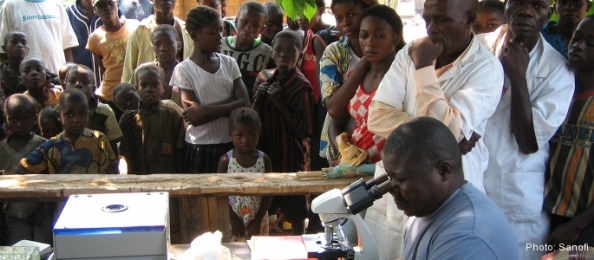WHO and Sanofi: A Public-Private Partnership to Save Lives
For Sanofi, as a global healthcare partner, improving access to healthcare for the most disadvantaged patients is pivotal to its corporate social responsibility approach. At the core of this commitment is the long-term partnership with the World Health Organization (WHO) to control a group of debilitating infectious diseases, called “neglected tropical diseases,” which affect mostly poor people in developing countries. Since the partnership began, in 2001, more than 20 million people in sub-Saharan Africa have been screened for sleeping sickness, and more than 170,000 patients have received free treatment for what is a fatal disease, if left untreated. This partnership has put the elimination of sleeping sickness within reach – a prospect that was unthinkable a decade ago.
Sleeping sickness: A neglected tropical disease threatening millions of people in Africa
More than one billion people worldwide are at risk from – or are affected by – a group of infectious tropical diseases that the international community considers to be “neglected diseases.” They are called “neglected” because the people who are most affected by these diseases are often the poorest populations, living in remote, rural areas, urban slums, and conflict zones with poor living and hygiene conditions. Neglected tropical diseases persist under conditions of poverty and are concentrated almost exclusively in the most disadvantaged populations in developing countries.
Without a strong political voice to address the issue, these tropical diseases will continue to have a low profile and a low status in public health priorities, even though they are endemic in 149 countries and territories. Their consequences range – depending on the disease – from blindness, disfiguring scars and ulcers, severe
pain, limb deformities, impaired mental and physical development, to death.
Sleeping sickness (also known as human African trypanosomiasis) is a parasitic disease transmitted by the bite of an infected Glossina insect, commonly known as the tsetse fly. If left untreated, the parasites invade the central nervous system and cause severe symptoms such as changes in behavior, confusion, poor coordination, and disturbance of the sleep cycle (which gives the disease its name). Without treatment, sleeping sickness is generally fatal.
Sleeping sickness threatens millions of people in 36 countries in sub-Saharan Africa. Many of the affected populations live in remote areas with limited access to adequate health services, making surveillance, diagnosis, and treatment of the disease very challenging. In certain areas, displacement of populations due to conflict is an additional factor favoring transmission of the disease, in regions where health systems are weak or non-existent.
A 1995 WHO Expert Committee estimated that 60 million people were at risk, with an estimated 300,000 new cases per year in Africa, of which fewer than 30,000 cases were diagnosed and treated. During epidemics, prevalence reached 50 percent in several villages in the Democratic Republic of the Congo, Angola, and Southern Sudan. Sleeping sickness was the first or second greatest cause of mortality in those communities, ahead of even HIV/AIDS.
| Initiator | Sanofi |
| Project start | 2003 |
| Status | ongoing |
| Region | Africa |
| Contact person | By Dr. Benedict Blayney |
| Awards |
| Anti-Corruption | - |
| Business & Peace | - |
| Development | x |
| Environment | - |
| Financial Markets | - |
| Implementing UNGC Principles in your Corporate CSR Management | - |
| Human Rights | x |
| Labour Standards | - |
| Local Networks | - |
| Advocacy of global issues | x |
| Business opportunities in low income communities/countries | - |
| Project funding | x |
| Provision of goods | x |
| Provision of services/personal | x |
| Standards and guidelines development | - |
A partnership born from a desperate situation
Despite the efforts of WHO, the situation for sleeping sickness was becoming desperate in 1999 when drugs to treat the disease were likely to be discontinued, and manufacturing to come to an end. However in 2000, discussions were initiated between WHO and Aventis, one of the parent companies of Sanofi, which manufactured three of the five drugs used to treat the disease (pentamidine, melarsoprol, and eflornithine) to find a solution to the problem of access to drugs.
On May 3, 2001, a landmark agreement was signed between WHO and Aventis, initially for a five-year period. The objectives of this agreement were to restore control activities; to ensure systematic screening of sleeping sickness and availability of medicines; and to train staff in endemic countries. This agreement was renewed by Sanofi in 2006 and 2011, each time for another five years. From 2006 onwards, the partnership with WHO was extended to include other neglected tropical diseases such as leishmaniasis, Chagas disease, Buruli ulcer, and yaws.
Beyond drug donations, Sanofi provides WHO with funding to support training, logistics, and infrastructure. From 2001 to 2012, Sanofi has provided $ 60 million in financial support and sleeping sickness drug supplies to WHO.
At the London declaration meeting on Neglected Tropical Diseases, held in January 2012, in the presence of Dr. Margaret Chan, Director General of WHO, Sanofi pledged to provide sleeping sickness medication until the disease was eliminated.
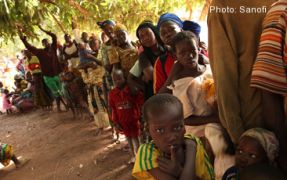
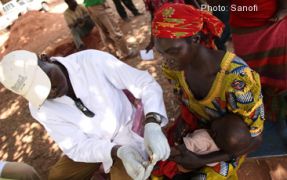
On the path to elimination
The results speak for themselves. To date more than 20 million people in endemic areas have been screened for sleeping sickness, and more than 170,000 patients have received treatment for what is a fatal disease, if left untreated. Through public awareness, control, and surveillance programs implemented in endemic countries, the number of new cases reported has also dropped by some 72 percent – from more than 25,000 in 2001 to less than 7,000 in 2011 (the estimated number of total cases is currently 30,000). These results have been achieved despite the complexity of the screening process required to detect the parasite in remote areas of sub-Saharan Africa with little medical infrastructure (this process involves an antigen-antibody blood test followed, if positive, by a lymph gland puncture, or blood film, to be reviewed by a skilled technician under the microscope, and finally a lumbar puncture and analysis of the cerebral spinal fluid, should evidence of the parasite have been found in the prior tests).
Treatment for late stage disease is complex and poorly tolerated with several intravenous infusions per day. This is why Sanofi is also collaborating with the Drugs for Neglected Diseases initiative (DNDi, a collaborative, patients’ needs-driven, nonprofit drug research and development organization) to develop a promising new oral treatment for sleeping sickness. This could potentially replace the current treatments, which are complex and difficult to administer. If this new drug is safe and effective, it will make treatment much easier for patients. Sanofi and DNDi also started in 2011 a three-year collaboration agreement for research on new treatments for eight other neglected tropical diseases listed by the WHO.
Testimonials
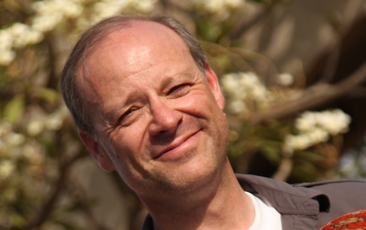
“The key to success in fighting these diseases is the need to address the multidimensional factors. What is the point in a pharmaceutical company providing treatments, if there are insufficient resources on the ground to provide the healthcare that is needed, or if people are not aware of the symptoms, and cannot be correctly diagnosed and treated?
Since the beginning of our partnership, we have worked closely with WHO to identify the real needs of people. We have ensured that our commitment not only includes, but also goes beyond, donations of medicines. As a result of the resources we have committed, and the tremendous passion and dedication of the teams, WHO can ensure that trained staff, efficient screening and diagnosis, treatment, disease surveillance, and health education are available and made accessible to all patients.
Thanks to WHO’s leadership and the combined efforts of national control programs, academia, nongovernmental organizations, and pharmaceutical companies, we can look forward to the day when the word ‘neglected’ no longer applies to tropical diseases. I would like to congratulate and commend all those involved in this endeavor.”
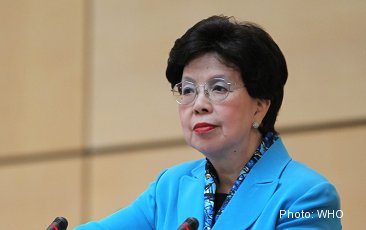
“Above all, this partnership shows what is possible when a pharmaceutical company wants to see its products make a difference in the lives of impoverished people living in remote places. In collaboration with WHO and national control programs, multiple challenges – beyond the donation of drugs – have been progressively tackled in ways that build sustainable capacity. The results speak for themselves.”
Backround
Addressing inequalities in access to healthcare
A majority of the global population does not have access to adequate healthcare today. This is a complex issue, and responsibility for tackling it lies with many different stakeholders: governments, the World Health Organization (WHO) and other international organizations, NGOs, academia, pharmaceutical companies, and funders. As developers and manufacturers of life-saving products, pharmaceutical companies have a crucial role to play. Enabling individuals to assert their right to health means facilitating access to quality medicines and vaccines for as many patients as possible, whether they live in developing, emerging, or developed countries.
For Sanofi, access to healthcare is not only a matter of the patient having access to affordable medicines and vaccines, but also of having the opportunity to benefit from disease prevention and to receive comprehensive care – from diagnosis through to treatment. Sanofi is committed to supporting governments’ and other stakeholders’ efforts to reducing the barriers to help all people access healthcare. For this reason, it has designed initiatives to address major public health priorities while supporting an economically viable business model that places patients and their needs at the center of its concerns.
This project description was originally presented in the Global Compact International Yearbook 2013.
Dr Benedict Blayney is Director Neglected Tropical Diseases at Sanofi.
Pierre-Guillaume Harscouët is CSR Senior Manager/ Corporate Social Responsibility at Sanofi.
Sanofi's sustainability approach places the patient at the heart of the Group’s business conduct. This approach is based on four key areas: Patient, People, Ethics and Planet.
Corporate Social Responsibility (CSR) is at the heart of Sanofi's development strategy because its long-term sustainability depends on it. As a patient-centred global healthcare leader, it therefore makes certain that it always acts ethically and responsibly in support of economic and social development while preserving the environment.
Write a comment about this page
Your comments are provided by your own free will and you take sole responsibility for any direct or indirect liability. In order to maintain the highest discussion quality, all comments will be reviewed by our editors. You hereby provide us with an irrevocable, unlimited, and global license for no consideration to use, reuse, delete or publish comments in accordance with our Community Guidelines.
About Us // Privacy Policy // Copyright Information // Legal Disclaimer // Contact
Copyright © 2012-2018 macondo publishing GmbH. All rights reserved.
The CSR Academy is an independent learning platform of the macondo publishing group.

